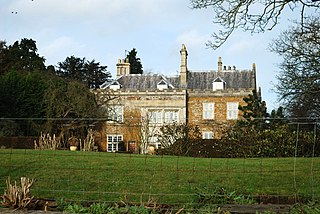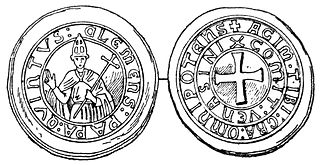| |||||
| Centuries: | |||||
|---|---|---|---|---|---|
| Decades: | |||||
| See also: | Other events of 1476 List of years in Ireland | ||||
Events from the year 1476 in Ireland.
| |||||
| Centuries: | |||||
|---|---|---|---|---|---|
| Decades: | |||||
| See also: | Other events of 1476 List of years in Ireland | ||||
Events from the year 1476 in Ireland.
The Regius Professorships of Divinity are amongst the oldest professorships at the University of Oxford and the University of Cambridge. A third chair existed for a period at Trinity College Dublin.

Thomas FitzGerald, 10th Earl of Kildare, also known as Silken Thomas, was a leading figure in 16th-century Irish history.

Sir William Skeffington was an English knight who served as Lord Deputy of Ireland.

The Dean of St Patrick's Cathedral is the senior cleric of the Protestant St Patrick's Cathedral, Dublin, elected by the chapter of the cathedral. The office was created in 1219 or 1220, by one of several charters granted to the cathedral by Archbishop Henry de Loundres between 1218 and 1220.
Hugh Curwen was an English ecclesiastic and statesman, who served as Archbishop of Dublin and Lord Chancellor of Ireland from 1555 to 1567, then as Bishop of Oxford until his death in November 1568.

Gerard FitzGerald, 9th Earl of Kildare, was a leading figure in 16th-century Irish History. In 1513 he inherited the title of Earl of Kildare and position of Lord Deputy of Ireland from his father.
Events from the year 1534 in Ireland.
The Archbishop of Dublin is the head of the Archdiocese of Dublin in the Catholic Church, responsible for its spiritual and administrative needs. The office has existed since 1152, in succession to a regular bishopric since 1028. The archdiocese is the metropolitan see of the ecclesiastical province of Dublin, and the archbishop is also styled the Primate of Ireland. The cathedral church of the archdiocese is Saint Mary's Pro-Cathedral in Dublin city, although the Church formally claims Christ Church as its cathedra, and the archbishop's residence is Archbishop's House in Drumcondra.
Events from the year 1581 in Ireland.
John Alen was an English priest and canon lawyer, whose later years were spent in Ireland. He held office as Archbishop of Dublin and Lord Chancellor of Ireland, and was a member of the Privy Council of Ireland. In the latter office, for a few years, he played a central role in the government of Ireland.
Hugh O'Reilly was an Irish prelate of the Roman Catholic Church. He served as Bishop of Kilmore from 1625 to 1628 and Archbishop of Armagh from 1628 to 1653.

John Allen Fitzgerald Gregg CH (1873–1961) was a Church of Ireland clergyman, from 1915 Bishop of Ossory, Ferns and Leighlin, in 1920 translated to become Archbishop of Dublin, and finally from 1939 until 1959 Archbishop of Armagh. He was also a theologian and historian.
John Parker was a Church of Ireland clergyman who came to prominence after the English Restoration, first as Bishop of Elphin, then as Archbishop of Tuam and finally as Archbishop of Dublin and Primate of Ireland.
George Browne D.D. was an English Augustinian who was appointed by Henry VIII of England to the vacant Episcopal see of Dublin. He became the king's main instrument in his desire to establish the state church in the Kingdom of Ireland. An iconoclast, during the Protestant Reformation he is noted for destroying the Bachal Isu, one of the symbols of authority of the Archbishop of Armagh.
Sir John Alan was a leading English-born statesman in sixteenth century Ireland. He was a member of the Irish House of Commons, and held the offices of Master of the Rolls in Ireland, Chancellor of the Exchequer of Ireland and Lord Chancellor of Ireland. Though he was childless himself, one of his brothers, William, founded a prominent landowning dynasty in County Kildare. The family's holdings included lands at Celbridge, St. Wolstan's and Kilteel, County Kildare, as well as substantial lands in County Dublin. They also acquired a baronetcy.
Thomas St. Lawrence, also called Thomas Howth (c.1480–1553) was a leading statesman and judge in sixteenth-century Ireland. He held the offices of Attorney General for Ireland and justice of the Court of King's Bench (Ireland) and was a member of the Privy Council of Ireland. He is remembered today mainly for his efforts to save the life of John Alen, Archbishop of Dublin, who was murdered during the Rebellion of Silken Thomas. He was also noted for his opposition to the Reformation. The latter stance led to a bitter clash with the leading Protestant reformer John Bale, Bishop of Ossory. The St Lawrence family were Barons and later Earls of Howth, hence his alternative name, Thomas Howth.
Liber Niger may refer to:

The medieval University of Dublin was an early unsuccessful attempt to establish a university in Dublin, the capital city of the Lordship of Ireland. Founded in 1320, it maintained an intermittent existence for the next two centuries, but it never flourished, and disappeared for good at the Reformation in Ireland (1534–41). It was located in Saint Patrick's Cathedral, Dublin. It had no connection with the present University of Dublin, better known as Trinity College Dublin, which was founded in 1592.
Charles Reynolds was an Irish Catholic cleric, canonist, and diocesan administrator. Born in County Leitrim, son of Marcus MacRaghnaill, Reynolds entered a religious order and was appointed to influential posts as archdeacon and chaplain to the Earl of Kildare. His name in native Irish is Cathal Mac Raghnaill, but he anglicized his name to Charles Reynolds in order secure ecclesiastical benefices under English laws. He was educated at the University of Oxford and fluent in English, Irish, and Latin. Reynolds opposed Henry VIII of England's separation from the Catholic Church, declining to acknowledge him as Supreme Head of the Church of England and refusing to acknowledge the annulment of his marriage to Catherine of Aragon.
Geoffrey Fyche was Dean of St Patrick's Cathedral, Dublin from his election on 9 March 1529 until his death on 8 April 1537.